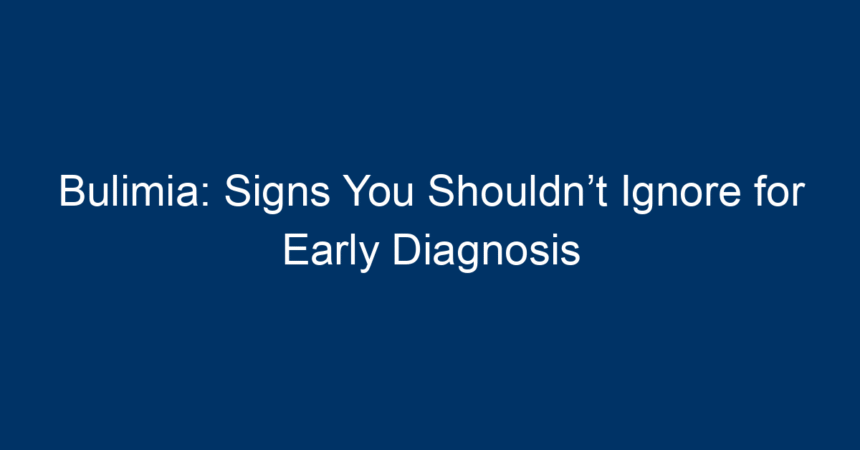Bulimia nervosa, commonly referred to as bulimia, is a serious eating disorder affecting millions of individuals worldwide. Characterized by a cycle of binge eating followed by compensatory behaviors such as vomiting, excessive exercise, or laxative use, bulimia can have dire health consequences if left untreated. Early diagnosis is crucial for effective intervention and recovery. In this article, we will explore the signs of bulimia that you should never ignore and provide actionable insights for early detection and treatment.
Understanding Bulimia Nervosa
Bulimia nervosa often arises from complex emotional, psychological, and environmental factors. Individuals may develop bulimia as a way to cope with stress, anxiety, or dissatisfaction with their body image. Understanding the nature of this disorder is essential for recognizing its signs and seeking timely help.
The Cycle of Bulimia
The cycle of bulimia typically involves two phases: binge eating and purging. During a binge, individuals consume large quantities of food in a short period, often feeling a loss of control. This is usually followed by feelings of guilt and shame, leading to purging behaviors. This cycle can create a damaging loop, reinforcing negative feelings and worsening the disorder.
Recognizing the Signs of Bulimia
Physical Symptoms
Several physical symptoms can signal the presence of bulimia. Understanding these signs can lead to early diagnosis and intervention.
-
Chronic Dehydration: Frequent vomiting leads to dehydration. Symptoms include dry skin, dizziness, and increased thirst.
-
Gastrointestinal Issues: Frequent purging can cause severe gastrointestinal problems, such as acid reflux, constipation, and bloating.
-
Dental Erosion: The acid from vomit can erode tooth enamel, leading to severe dental issues. Frequent dental visits may reveal unusual wear on teeth.
-
Electrolyte Imbalance: Excessive purging can result in electrolyte imbalances, which are dangerous and can lead to heart complications or seizures.
- Weight Fluctuations: Individuals with bulimia may experience rapid weight changes due to their binge-purge cycle, often ranging from normal weight to underweight.
Behavioral Signs
In addition to physical symptoms, certain behavioral patterns can indicate bulimia.
-
Secretive Eating Habits: A person with bulimia may eat in secret, hiding their binges from family and friends.
-
Withdrawal from Social Activities: Social gatherings involving food may trigger anxiety, leading individuals to withdraw from events.
-
Excessive Exercise: To compensate for binge eating, many individuals engage in relentless exercise routines, often to the point of exhaustion.
- Frequent Visits to the Bathroom After Meals: A common behavior associated with bulimia is retreating to the bathroom shortly after eating, which may be a sign of purging.
Emotional and Psychological Signs
Recognizing emotional and psychological signs is vital for an accurate diagnosis.
-
Mood Swings: Individuals with bulimia may experience significant mood swings, often feeling anxious or depressed.
-
Preoccupation with Body Image: An intense focus on weight and appearance can lead to distorted body image and self-worth issues.
-
Guilt and Shame: Feelings of guilt or shame following a binge can perpetuate the cycle of bulimia, contributing to low self-esteem.
- Isolation: Those struggling with bulimia may isolate themselves due to embarrassment about their eating habits.
The Importance of Early Diagnosis
Early diagnosis of bulimia is critical for several reasons:
-
Prevent Health Complications: Untreated bulimia can lead to severe health issues, including kidney failure, gastrointestinal damage, and cardiac problems.
-
Improve Recovery Outcomes: Early intervention typically results in better recovery outcomes, reducing the likelihood of relapse.
- Address Co-Occurring Disorders: Bulimia often occurs alongside other mental health issues such as anxiety and depression. Early diagnosis allows for comprehensive treatment of both the eating disorder and any co-occurring conditions.
Seeking Help: What to Do Next
If you or someone you know exhibits signs of bulimia, seeking professional help is paramount. Here are actionable steps to take:
Find a Professional
Look for mental health professionals specializing in eating disorders. Therapists, nutritionists, and medical doctors can provide a well-rounded approach to treatment.
Educate Yourself and Others
Understanding bulimia can facilitate discussions and reduce stigma. Information can empower both the individual suffering and their support system.
Build a Support System
Reach out to friends and family who can provide emotional support. Support groups, both online and in-person, can also be incredibly beneficial.
Practice Self-Compassion
Encouraging self-kindness can be a significant step in recovery. Acknowledge feelings and avoid self-judgment as part of the healing process.
Treatment Options for Bulimia
Treatment for bulimia typically involves a combination of therapy, nutritional guidance, and in some cases, medication. Here are some common approaches:
Cognitive Behavioral Therapy (CBT)
CBT is one of the most effective therapies for bulimia, focusing on changing harmful thought patterns and behaviors associated with the disorder.
Nutritional Counseling
Working with a dietitian can help individuals develop a healthier relationship with food and establish balanced eating habits.
Medication
In some cases, doctors may prescribe medications such as antidepressants to help manage the psychological aspects of bulimia.
Conclusion
Bulimia is a complex and serious eating disorder that requires attention and timely intervention. By recognizing the signs of bulimia—whether they are physical, behavioral, or emotional—you can take the first step toward seeking help. Remember, early diagnosis is key to effective treatment and recovery. If you notice any signs in yourself or others, don’t hesitate to reach out for support. Together, we can foster healthy relationships with food and promote the road to recovery.
Actionable Insights for Readers
-
Educate Yourself: Familiarize yourself with the signs and symptoms of bulimia and share this knowledge with friends and family.
-
Encourage Open Conversations: Create an environment where discussions about eating disorders are open and stigma-free.
-
Seek Support: Don’t ignore the signs; reach out to professionals who specialize in eating disorders.
- Practice Mindfulness: Incorporate mindfulness techniques to help reduce stress and improve your relationship with food.
By understanding bulimia and taking proactive steps, you can help prevent its escalation and pave the way for recovery. Remember, you are not alone, and help is available.




